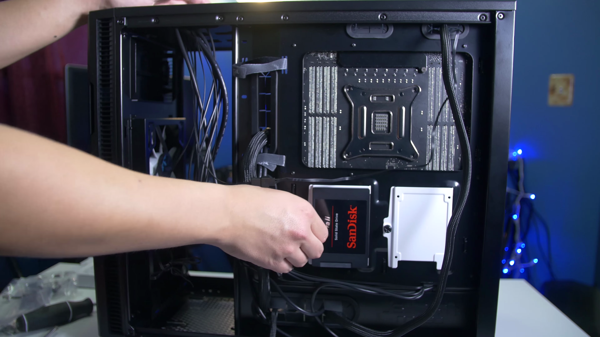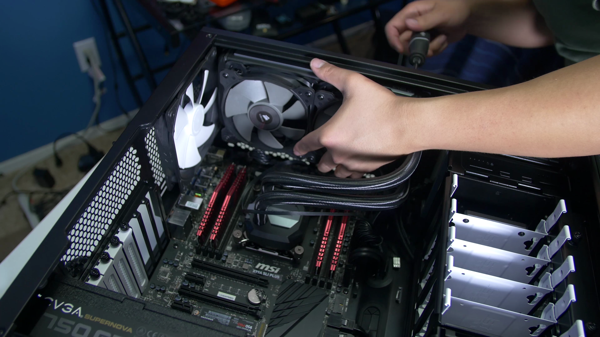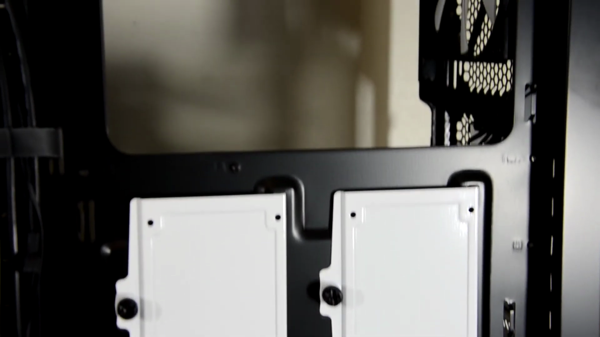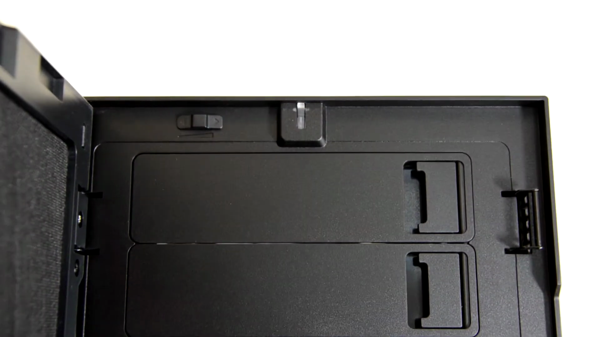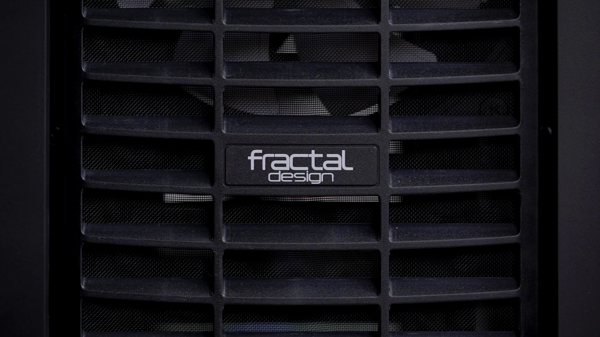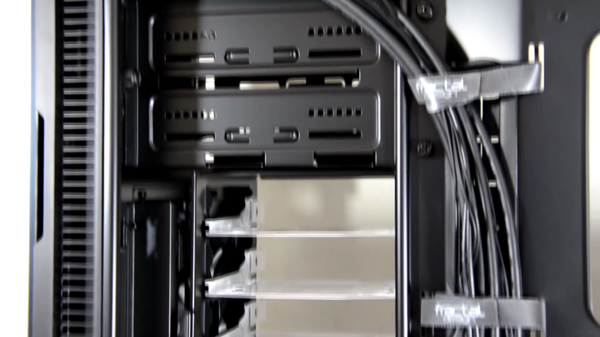Note: As an Amazon Associate I earn from qualifying purchases.
My build experience with the Fractal Design Define R5 Mid Tower Case (2024)
Introduction
For the office I recently purchased a Fractal Design Define R5 PC case for a quiet computing setup. After using it extensively for several months, below are my thoughts on its operation (quite silent), adaptable design, effective cooling, and long-term use.
Specifications
| Property | Value | Property | Value |
|---|---|---|---|
| Brand | Fractal Design | Motherboard Compatability | ATX |
| Case Type | Mid Tower | Recommended Uses For Product | Gaming |
| Color | Black | Material | Aluminum |
| Cooling Method | Air | Model Name | Fractal Design Define R5 Black |
| Fan Size | 140 Millimeters | Item Weight | 10700 Grams |
Photos
Click on photos to enlarge them:
Silent Operation Review

When I chose the Fractal Design Define R5, my primary concern was achieving a silent computing environment. Here’s what stood out to me in my day-to-day use:
Build: The case’s construction is strong, conveying a high-end impression.
The material is effective in reducing noise due to its density.
Fan options: With two Dynamic GP14 140mm fans included, the airflow is smooth and, more importantly, quiet.
However, having many fan mounts in the case may not be ideal if you aim for minimal noise. The excessive fans might unwantedly boost operational noise instead.
The soundproofing effectively reduces noise. I was amazed by how quiet my workspace became, barely hearing any sound even when my system was under heavy load. This is a clear demonstration of the Define R5 case’s soundproofing materials’ effectiveness.
Despite the effective sound insulation, there’s no sacrifice in cooling performance. The case ensures good airflow, an essential aspect for quiet operation. Fractal Design has achieved this balance effectively. However, I observed that the case fans are 3-pin, meaning they don’t support PWM for finer control compared to 4-pin fans. This might be a disadvantage for some users desiring precise fan speed and noise level adjustments.
Here’s my quick rundown:
Pros:
This material effectively reduces sound while allowing for good airflow.
Solid build quality
Pre-installed quality fans
Cons:
Additional fans increase noise.
Basic 3-pin fans without PWM
Installing large components in R5 was easy due to its ample space. I effortlessly installed my bulky heatsink/fan combination, without encountering any spatial limitations. The pre-installed case fans function effectively in maintaining a cool and quiet system temperature.
I must mention that even though the case runs silently, some hard drives and optical drives may emit noise that can be heard over the fans’ quiet hum. Despite this, the case aims for silent operation and largely succeeds in most areas.
If you’re looking for a quiet case with good functionality, consider the Define R5. It strikes a good balance between silence and performance. Although it could benefit from PWM fans, overall it’s an excellent choice for building a PC where noise is a concern. For those who prioritize a discreet presence in their workspace or gaming setup, this case should be at the top of your list.
Design and Configuration Flexibility

In the PC building world, a case’s versatility significantly influences the user experience. The Fractal Design Define R5 case exemplifies the value of adaptability in design and setup. I discovered several notable features during my time with this case:
With Drive Configuration Freedom of up to eight hard drive bays, this system offers remarkable versatility. This flexibility allows me to construct expansive RAID arrays or make space for a few SSDs, contingent upon my needs.
The Define R5 mid-tower case is Water Cooling Ready, expanding its cooling capabilities. It supports large radiators, allowing for installation of radiators up to 420mm in size on the top and 360mm in the front. This feature is notable for a case of its dimension, making it an ideal choice for water cooling enthusiasts.
I offer Fan Configuration Options in my ModuVent system, allowing me to change fan covers toolessly. This feature caters to my noise concerns while addressing future cooling requirements, as I can choose between sound absorption and extra fan placement.
The motherboard tray provides ample cable management and offers multiple SSD mounts. Installing and removing these mounts is straightforward. The careful design of the mount placements and cable pass-throughs is noteworthy.
Here’s a quick breakdown of the positives and negatives I encountered:
Pros:
The design includes a modular arrangement for installing drives and fans.
Supports cooling systems for both air and liquid.
Simple cable management design.
Sturdy materials and build quality.
Cons:
- A USB-C port on the front panel is not present.
- Stock fans have three pins, which may necessitate an upgrade for enhanced control.
While the R5 monitor may seem large for small desks and its power/HDD LED can be distracting in dark environments, these issues are overshadowed by its benefits.
I should mention that the side panels, which are sturdy, open like doors, posing a challenge in confined spaces. The marketing claims this case as silent, but its sound dampening is noticeably better, though my computer’s hum remains audible albeit reduced.
The Fractal Design Define R5 is a popular choice in mid-tower cases due to its versatile features. It can accommodate various build types, from quiet and minimalistic to complex water-cooled systems with high airflow. While it has some minor flaws, the case’s adaptability makes it an ideal pick for diverse PC building requirements.
Cooling Efficiency Assessed

Evaluating the cooling efficiency of the Fractal Design Define R5 case is essential to ensure optimal system performance and prevent potential hardware damage. Here’s my assessment of its airflow and cooling capabilities:
Pre-installed Fans: The Define R5 includes two Fractal Design Dynamic GP-14 140mm fans. These fans deliver satisfactory performance in my tests, supplying ample airflow while maintaining low noise levels.
Fan Upgrade: The fans could be upgraded with the given fan mounts featuring ModuVent covers. This is beneficial for individuals building complex systems with increased heat output, allowing them to enhance airflow as required.
Radiator Support: This case supports radiators up to 420mm in the top and 360mm in the front. Water-cooling enthusiasts will appreciate this feature for extensive cooling setups, especially for overclocking or systems with hot GPUs.
However, it’s not without its drawbacks:
Fan Speed Control: The included fans are only three-pin, meaning there’s no PWM control for more precise fan speed adjustment. I’d prefer four-pin fans for this level of case.
When considering the addition of fans in my system, it’s essential to weigh the benefits of increased airflow against the potential drawbacks of higher noise levels. The Noise vs Airflow ratio is a crucial factor to evaluate when making adjustments to ensure an optimal balance between efficient cooling and acceptable sound levels.
In my setup, I added an additional front fan for improved airflow over the components without significant noise increase. Thoughtful design of internal airflow paths and dust filters keep the system clean, essential for long-term optimal cooling performance.
One issue I noticed was the lack of dust filters on the top of the case, which could be problematic if the ModuVent panels are open. Despite its focus on quiet operation, the case still provides sufficient cooling for most systems except for those that are extremely demanding.
In essence, the Define R5 case effectively maintains a cool environment for your PC, allowing flexibility as your cooling needs change. It accommodates additional fans and radiators, enabling it to manage heat efficiently whether you’re building quietly or supporting high-performance components that require increased airflow.
Long-term User Impressions

Having used the Fractal Design Define R5 for an extended period, I have mostly positive experiences. The build quality is exceptional with a sturdy metal frame. The sound-proofing panels effectively dampen noise.
Here’s a summary of my experience after long-term use:
Pros:
Strong construction and ample space characterize this design.
The setup offers ample cable management options for a neat appearance.
Customizable modular drive bays, a key feature of these innovative solutions, provide flexibility for diverse requirements. With this customizable design, users can tailor their storage configurations according to specific needs.
Dust filters help keep the system clean.
Quieter operation as compared to many other cases, despite the addition of extra fans
Cons:
Three-pin connectors are used by stock fans, resulting in fewer control options compared to PWM fans with four pins.
Installing side panels may be challenging if desk space is limited.
Bright LED indicators can be distracting in dark environments due to their intense luminosity.
The Define R5 case showcases impressive modularity, allowing for flexible internal configurations. This feature enables users to effortlessly rearrange bays or even remove them during upgrades or distinct builds, enhancing daily use and ensuring optimal airflow. The attention to detail in the design is further underscored by elements like a three-speed fan controller and easily accessible USB ports, reflecting the importance of modularity in modern computing solutions.
On the downside, the bright LED indicator is a concern. It’s a minor issue, but noticeable in a case meant for understated design. A simple solution is tape, yet an overlooked detail in an otherwise well-thought-out plan. Another matter is the side panels. While they provide noise reduction with padding, they don’t slide off easily, instead opening on hinges, potentially causing inconvenience in smaller areas.
I’ve predominantly stuck with air cooling, so my experience with adding more fans has not affected the slight increase in noise levels. However, for silence-focused users looking to pack their case with fans, this could be a significant consideration.
The Realm of Expandability in the Define R5 case is considerable, allowing for up to 8 hard drives or SSDs. This feature is advantageous for long-term, versatile computer builds. The case’s ability to expand and change makes it a worthwhile investment for future needs.
The Fractal Design Define R5 is an excellent example of versatility and exceptional quality in PC cases, a fact that has been proven over time. With its flexibility to accommodate multiple system upgrades, this case has consistently surpassed expectations and demonstrated its value. Although it comes with a few minor drawbacks, such as fan connectors and a bright power LED, these issues do not detract from its dependable performance or versatility. In fact, the Define R5’s quiet design makes it an excellent choice for those seeking a customizable PC case that offers both versatility and excellent quality.
